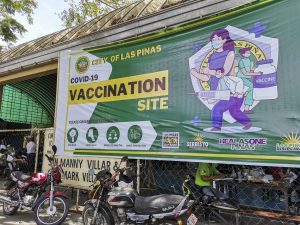Since early 2020, health experts have emphasized the need to support fragile countries during the pandemic to prevent the further spread of COVID-19 across the world. In response, the G7 nations last year affirmed their commitment to provide “affordable and equitable access to vaccines, therapeutics and diagnostics” globally.
Despite this rhetoric, wealthy nations continue to put their needs and interests over those of lower income countries. They are hoarding vaccines from poorer countries (with some countries like the United States and Canada now offering their citizens third and fourth booster shots) and as a result, around 78 percent of the population in high and upper-middle income countries have received at least one dose of the COVID-19 vaccine in contrast to only 11 percent of people in low-income countries. Even the targets for COVAX, the global initiative to send vaccines to lower and middle-income countries, have been repeatedly cut back due to production issues, export bans, and vaccine hoarding by wealthy nations.
Consequences of Vaccine Inequity on the Philippines
The Philippines is one of the many countries dealing with the effects of vaccine inequity. Despite being one of the hardest hit countries in Southeast Asia in 2021, the Philippines has had to wait for vaccines from wealthy countries. The country now has over 3.5 million confirmed cases of COVID-19 and around 54,003 deaths. While its daily infection numbers had reduced significantly by the end of 2021, the rapidly spreading Omicron variant is concerning. The country’s vaccination rate remains relatively low, with only 52 percent of the population fully vaccinated, and recent evidence suggests that vaccines like AstraZeneca and Sinovac, used in low-income countries like the Philippines, provide less protection against Omicron than the mRNA vaccines produced by Pfizer and Moderna.
However, not all Filipinos have been impacted equally by vaccine inequity and the pandemic in general. In November 2021, 93 percent of residents in the capital region had been fully vaccinated in comparison to only 10.9 percent of people in the predominantly Muslim regions in southern Philippines. More broadly, research shows that the government has ignored the unique needs and vulnerabilities of marginalized groups in the Philippines such as the poor, Indigenous Peoples, and disabled people, which has affected their access to food and income, among other issues, throughout the pandemic.
Although the Philippine government is aware of the necessity of supporting vulnerable groups in order to curb the spread of the virus, it has repeatedly chosen to scapegoat and criminalize the poor who have to pursue their livelihood outside the home (due specifically to insufficient government assistance) for “violating” lockdown measures. Just like wealthy countries’ attempts to “boost [their] way out of the pandemic,” the Philippine government’s solution to fighting the pandemic through criminalization is both unethical and ineffective at actually mitigating the spread of the virus.
Lack of Adequate Support for Typhoon Victims
Another group that has been heavily impacted by the COVID-19 pandemic in the Philippines are the over 75,000 residents of resettlement sites in Tacloban City, homes that were built for the hundreds of thousands of Typhoon Haiyan survivors. Our June 2021 study on the impact of COVID-19 on 357 households in these resettlement sites found that participants did not receive sufficient support from the government to get through the pandemic. Specifically, over a third of participants found the national government’s response to the pandemic to be somewhat inadequate or very inadequate and very few felt that any level of government could protect them from COVID-19 in their community.
Financial problems and lack of livelihoods were cited by participants as the most serious problems they were facing during the pandemic, both of which have been worsened by the government’s pandemic response. For example, though 91.6 percent of participants received financial assistance from the government, 47 percent said it was insufficient. Specifically, the participants, the majority of whom make 15,000 pesos (around $300) or less monthly on average, noted that they did not have sufficient financial resources to buy food, maintenance medicine, and other necessities.
Many participants also said that as a result of COVID-19, they had lost their livelihoods or made a lot less money from their work, as they mostly work in-person. One participant noted that without a livelihood, they could not “support [their] big family and… cope with daily living.” Other issues mentioned by participants include the inadequate amount and quality of food, the lack of running water at home, and the inability to participate fully in online learning (particularly due to poor internet connections).
These findings reinforce yet again that the pandemic is no “great leveler.” In large part due to their financial and living conditions, socioeconomically disadvantaged communities are more likely to be affected by the pandemic. And by not addressing the specific needs of resettlement site residents, the Philippine government’s inadequate response has directly impacted their ability to meet their basic daily needs. As such, a group that was already vulnerable before the pandemic is now even more so, both financially and in terms of getting COVID-19.
How does the government solve this issue? In the above study, residents offered a variety of recommendations for how the government could better meet the challenges facing them, from providing more sustainable livelihood programs and offering sufficient financial assistance to the stricter implementation of COVID-19 health and safety protocols.
Ultimately, national and local governments in the Philippines must include marginalized groups when developing and executing their pandemic responses, specifically to understand their needs and the best ways to address them. This is necessary because, as a research study on community engagement found, “marginalized people living through the experience of COVID-19 have embodied knowledge, skills, and experience to inform equitable public policy.”
Wealthy nations must also support vulnerable nations by actually adhering to their commitments of sharing vaccine supplies as well as by sharing patents for vaccines so that countries in the Global South can produce them.

































